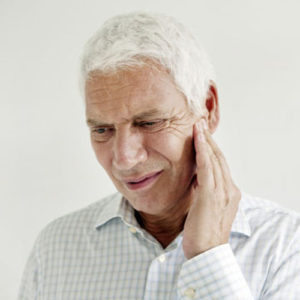
TMJ Disorder (Headache/Migraine Relief)
 Campbell, Los Gatos, San Jose, and Saratoga, Ca
Campbell, Los Gatos, San Jose, and Saratoga, Ca
Do you experience headaches, migraines, or head, neck, and back pain? Your mouth could be to blame! Temporomandibular joint disorder affects nearly 10 million Americans a year, and you could be one of them.
Temporomandibular joint disorder is also referred to as TMJ disorder, TMD, or TMJ. It is a condition of when your bite is misaligned, causing stress and strain on the jaw joints. The jaw joints are made to withstand a lot of pressure, considering how much we bite and chew. When your bite is out of line, the jaw is not able to function as it should. Even the slightest uneven bite can contribute to a chain reaction of pain that radiates into your head and throughout your body.
TMD is caused by various factors including:
- Missing teeth
- Crooked or uneven teeth
- Teeth that are broken or chipped
- Arthritis
- Injuries to the jaw or face
- Uneven bite
- Clenching or grinding of teeth
What are symptoms of TMD?
If you suffer from TMD, you may experience pain in the mouth, face, or head. Pain often radiates to other areas of the body. Sometimes, TMD causes debilitating migraines that interfere with your daily activities. Also, TMD is known to cause ear pain or ringing in the ears. Often times patients who have TMJ disorder may hear popping or clicking sounds in their jaws when they bite or chew. There are a variety of symptoms associated with TMJ disorders, and these symptoms may vary for each patient. In fact, some patients may be unaware they have a TMJ disorder, which is precisely why routine dental checkups are important for your oral health.
How is TMD treated?
Treatments for TMJ disorder vary for each patient, depending on the cause of their pain, but begins with a focus on neuromuscular dentistry. Dr. Lippi is specially trained in the techniques of neuromuscular dentistry, which focuses on optimal jaw alignment and proper occlusion (how your teeth come together).
Treating TMD with neuromuscular dentistry begins by determining the optimal resting position of the jaw, and bite alignment. A combination of treatments such as an oral appliance, orthodontics, or restorative dentistry may be used to maintain an optimal bite, which ultimately relieves stress on the jaw and the ongoing pain from TMD. Dr. Lippi will determine the best modality of treatment during your consultation.
How is TMD diagnosed?
Diagnosis TMJ disorder can be simple and is easily treatable. The important factor is, do not ignore your symptoms of TMJ disorder. Dr. Lippi and staff understand how TMJ disorder not only causes pain and discomfort but how the disorder interferes with your life.
Why should I see a neuromuscular dentist about my TMD?
The jaw joints house the most complex nerve in the head, the trigeminal nerve. This nerve runs along the lower jaw, and into the jaw joints, and connects to the spinal cord. Often, TMD is misdiagnosed, or the pain is only masked by medication. To truly treat TMD, techniques of neuromuscular dentistry must be applied to align the patient’s bite optimally. Without treating the source of the problem, symptoms will only worsen over time. A neuromuscular dentist, such as Dr. Lippi, is most qualified in diagnosing and treating TMD.
If you believe you may suffer from a TMJ disorder, contact Dr. Lippi’s office for a consultation. Allow us to help set you free from TMJ disorder. We can implement a treatment plan that not only reduces or eliminates pain, but we also focus to treat the cause of your TMJ disorder. We welcome patients from Campbell, Los Gatos, San Jose, and Saratoga, California.
